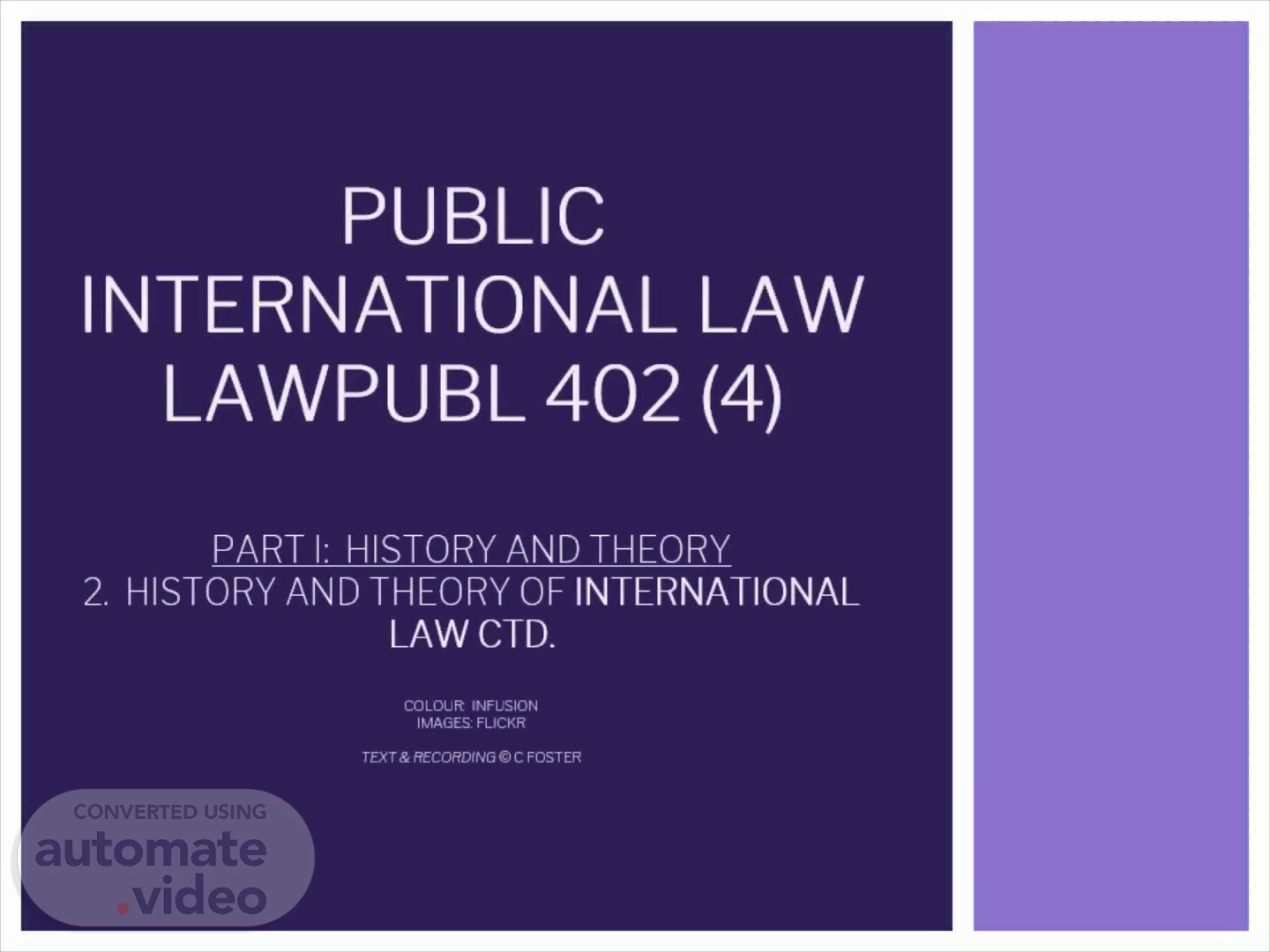
PUBLIC INTERNATIONAL LAW LAWPUBL 402 (4) PART I: HISTORY AND THEORY 2. HISTORY AND THEORY OF INTERNATIONAL LAW CTD. COLOUR: INFUSION IMAGES: FLICKR TEXT & RECORDING © C FOSTER
Scene 1 (0s)
. PUBLIC INTERNATIONAL LAW LAWPUBL 402 (4) PART I: HISTORY AND THEORY 2. HISTORY AND THEORY OF INTERNATIONAL LAW CTD. COLOUR: INFUSION IMAGES: FLICKR TEXT & RECORDING © C FOSTER.
Scene 2 (39s)
NEW AMERICA. WHY DO STATES COMPLY WITH INTERNATIONAL LAW?.
Scene 3 (2m 1s)
Man 'bites dog' A man of biting a police dog has appeared in court. John Kolio Fidow is facing 10 charges, including two animal cruelty related charges, three counts of burglary, and two charges of reckless driving relating to the incident on July 9. Police said Fidow crashed his vehicle in New Plymouth, then crashed a second vehicle after he took its keys. A dog which Fidow after he fled the scene was allegedly bitten on the head, thrown against a wall and onto the ground. Fidow, 33, was remanded in custody when he appeared with bandages on an arm and a hand at the New Plymouth District Court yesterday..
Scene 4 (3m 21s)
Egs: Iraq/Saddam Hussein, annexed Kuwait in 1991 Indonesia invaded East Timor in 1975 Russia took over the Crimean peninsula in 2014.
Scene 5 (4m 22s)
Sir Humphrey Waldock notes that: “It is significant that when a breach of international law is alleged by one party to a controversy, the act impugned is practically never defended by claiming the right of private judgment, which would be the natural defence if the issue concerned the morality of the act, but always by attempting to prove that no rule has been violated…” (H. Waldock, Brierly, The Law of Nations 6 th Ed, 1963)..
Scene 6 (6m 16s)
As asked by John Austin, The Province of Jurisprudence Determined (London, 1954). Remember that Austin viewed law as based on the concept of a sovereign who issues commands. Be ready for this question at social functions – it still gets asked!.
Scene 7 (7m 33s)
A RUSSIA 1. classical Marxism (Karl Marx 1818-1883): law and the state are expected to disappear 2. Russian Revolution, Lenin (1917), Russian empire comes to an end and USSR established in 1922: transitional phase in thought about international law 3. Stalinism (1927-1939): Soviet Union accepted only certain rules of international law, including: national self-determination, state sovereignty and the equality of states.
Scene 8 (10m 13s)
4. Post-Stalinist approach recognised instead that there was a single system of international law (Professor Grigory Tunkin ). 5. Khrushchev (1958-1964): new notion of the international law of peaceful co-existence became the dominant theory. Important ideas included good neighbourliness , international cooperation and the observance in good faith of international obligations. 6. Perestroika/restructuring, 1980s under Gorbachev, new commitment to the role of the United Nations, and to strengthening the international legal system and the international role of law 7. Dissolution of the Soviet Union in 1991. 8. Russian Federation participates in international law as we know it..
Scene 9 (11m 41s)
B) CHINA Chinese Communism (beginning in 1949). Politics, power and expediency. Now fully engaged in world politics & more legalised . 2016 Declaration of the Russian Federation and the People’s Republic of China on the Promotion of International Law.
Scene 10 (13m 19s)
. CONTEMPORARY ISSUES: RUSSIA AND CHINA. 1. The acquisition of Crimea by Russia.
Scene 11 (16m 18s)
2 The problems with China in the South China Sea. See “South China Sea dispute: Australia says Beijing's claims have no legal basis” https://www.bbc.com/news/world-australia-53536173 25 July 2020.
Scene 12 (17m 28s)
Recap of general points. .
Scene 13 (18m 30s)
For interest: Anthea Roberts, Paul B. Stephan, Pierre-Hugues Verdier , and Mila Versteeg, (eds) Comparative International Law (Oxford University Press, 2018) Phil C.W. Chan “China’s Approaches to International Law since the Opium Wars” [2014] Leiden Journal of International Law 859, 861-871, 882-888 Lauri Mälksoo , Russian Approaches to International Law (Oxford University Press, 2015).